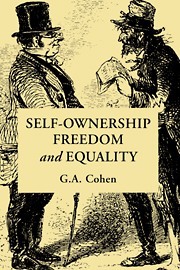Book contents
- Frontmatter
- Contents
- Preface
- Acknowledgements
- Introduction: history, ethics and Marxism
- 1 Robert Nozick and Wilt Chamberlain: how patterns preserve liberty
- 2 Justice, freedom, and market transactions
- 3 Self-ownership, world-ownership, and equality
- 4 Are freedom and equality compatible?
- 5 Self-ownership, communism, and equality: against the Marxist technological fix
- 6 Marxism and contemporary political philosophy, or: why Nozick exercises some Marxists more than he does any egalitarian liberals
- 7 Marx and Locke on land and labour
- 8 Exploitation in Marx: what makes it unjust?
- 9 Self-ownership: delineating the concept
- 10 Self-ownership: assessing the thesis
- 11 The future of a disillusion
- Bibliography
- Index of names
- Subject index
1 - Robert Nozick and Wilt Chamberlain: how patterns preserve liberty
Published online by Cambridge University Press: 29 August 2009
- Frontmatter
- Contents
- Preface
- Acknowledgements
- Introduction: history, ethics and Marxism
- 1 Robert Nozick and Wilt Chamberlain: how patterns preserve liberty
- 2 Justice, freedom, and market transactions
- 3 Self-ownership, world-ownership, and equality
- 4 Are freedom and equality compatible?
- 5 Self-ownership, communism, and equality: against the Marxist technological fix
- 6 Marxism and contemporary political philosophy, or: why Nozick exercises some Marxists more than he does any egalitarian liberals
- 7 Marx and Locke on land and labour
- 8 Exploitation in Marx: what makes it unjust?
- 9 Self-ownership: delineating the concept
- 10 Self-ownership: assessing the thesis
- 11 The future of a disillusion
- Bibliography
- Index of names
- Subject index
Summary
Let us now suppose that I have sold the product of my own labour for money, and have used the money to hire a labourer, i.e., I have bought somebody else's labour-power. Having taken advantage of this labour-power of another, I turn out to be the owner of value which is considerably higher than the value I spent on its purchase. This, from one point of view, is very just, because it has already been recognized, after all, that I can use what I have secured by exchange as is best and most advantageous to myself …
(George Plekhanov, The Development of the Monist View of History)1. Robert Nozick occupies the point of view Plekhanov describes, and his Anarchy, State, and Utopia is in good measure an ingenious elaboration of the argument for capitalism that Plekhanov adumbrates. The capitalism Nozick advocates is more pure than the one we have today. It lacks taxation for social welfare, and it permits degrees of poverty and of inequality far greater than most apologists for contemporary bourgeois society would now countenance.
This chapter is only indirectly a critique of Nozick's defence of capitalism. Its immediate aim is to refute Nozick's major argument against a rival of capitalism, socialism.
- Type
- Chapter
- Information
- Self-Ownership, Freedom, and Equality , pp. 19 - 37Publisher: Cambridge University PressPrint publication year: 1995

